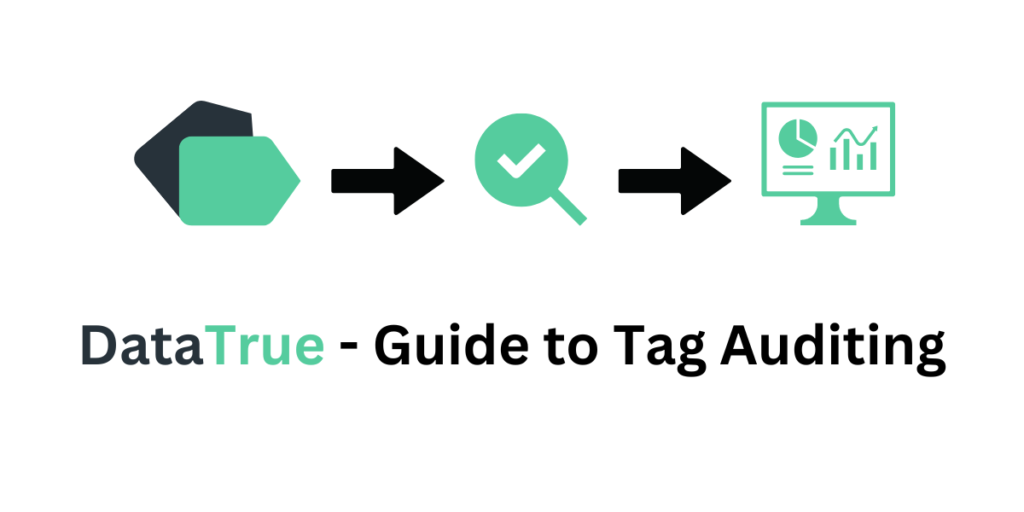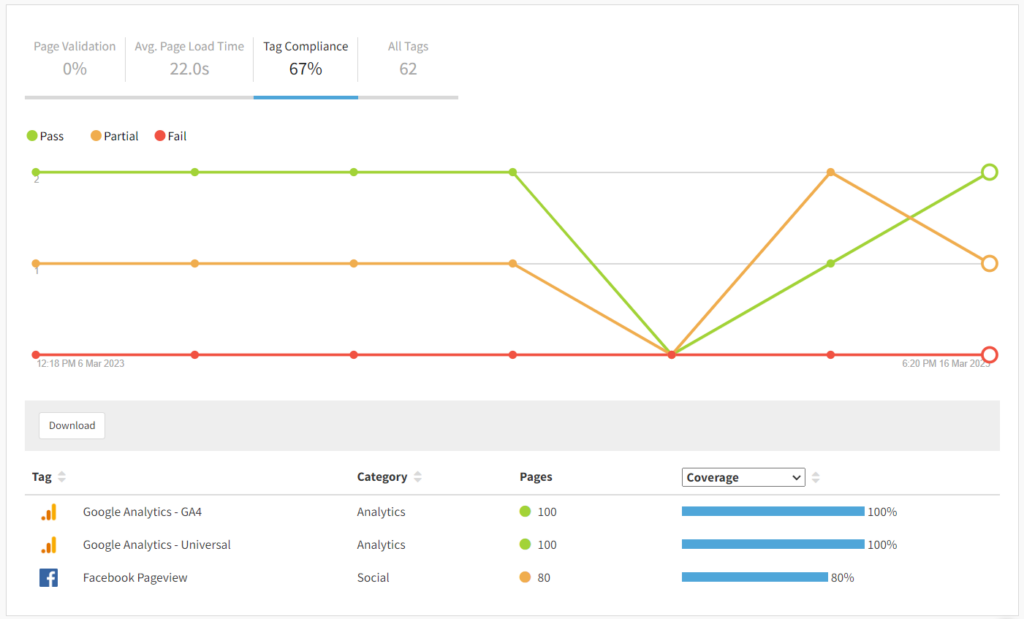
In the world of digital marketing, understanding the effectiveness of your website and online campaigns has become paramount to developing a successful marketing strategy.
Web tags are one of the many tools used to achieve an in-depth understanding of digital marketing performance and arguably one of the most important. Tags help track and measure website performance, user behaviour, as well as conversions.
However, as the number of web pages on your site grows, the sheer quantity of tags and tracking scripts used on a website can become overwhelming, leading to a downturn in data accuracy, as well as data quality.
That’s where tag auditing becomes crucial for maintaining data integrity.
Our guide will explore the fundamentals of tag auditing, its importance in the context of digital marketing and the benefits of ensuring your tags are firing correctly.
What is Tag Auditing?
Tag auditing refers to the process of evaluating tags on your website to ensure accurate data collection. This involves a systematic and comprehensive review of all tags present on the site. Tag audits examine which tags are currently on the site and what data they’re collecting in order to ensure functionality and accuracy.
Manual vs Automated Tag Audits

Manual and automated tag audits are the two methods used to ensure that website tags are working correctly and provide reliable data.
The difference between manual and automated tag audits is in the name. Manual audits require a human to manually inspect and test tags, whilst automated make use of software that scans a website and automatically identifies any issues or inconsistencies. As such, automated audits can save copious amounts of time and effort, as they can quickly scan and detect any tag errors or issues on a website.
Although manual audits can sometimes provide a more detailed analysis, high-quality tag governance software can offer the best of both worlds.
For instance, DataTrue’s web analytics testing solution features an automated tag audit toolset that provides comprehensive page reports on every single page. These reports list out critical data information that can be used to identify and resolve any errors you may be having, including:
- Loading times
- Tag validations
- Tag data payloads
- Errors written to the browser console
How Does Data Layer Testing Aid Tag Auditing?
Adding a data layer essentially creates a new segment or grouping of tags that can be tested, which helps streamline the overall auditing process.
Simply put, the data layer is an additional “layer” that helps to structure how data is passed from your website to the tag management system. It compiles all the data passed through the layer along with your tags.
Automated data layer testing can be considered a more comprehensive approach to automated tag auditing, since it provides alerts for any issues encountered across the entire user journey. For instance, the Data Layer Validation feature available within DataTrue’s wider solution utilises automated data layer testing to provide automated tag audits alongside alerts for issues that require manual reviews.

Is Tag Management the Same as Tag Auditing?
Although tag management and auditing are often used interchangeably, they have distinctly different roles and purposes.
Tag management refers to the process of organising and deploying website tags, while tag auditing entails validating website tags to prevent inaccurate data and guarantee that they are functioning correctly.
Tag Management System vs Tag Auditing Tool
Tag management systems are essentially web-based interfaces that offer a centralised point of control and deployment of all tags on a given site. Tag management systems replace all of the individual code for every single tag with a container that communicates directly with the software’s back end. This means that the website only needs to load the container rather than the code for each individual tag, greatly increasing overall performance and speed.
Despite making the deployment of tags easier, tag management systems also introduce the risk of inconsistencies and errors since every tag is managed through a singular container.
Tag auditing tools, like the one available in DataTrue’s all-in-one solution, allow you to schedule tests to ensure that major updates or changes to your site have not caused problems to your tag architecture.
Tag Auditing vs Tag Monitoring
While auditing involves validating and checking website tags to ensure their accuracy and performance, monitoring is the continuous process of tracking website tags to ensure that they’re functioning correctly, including amending broken or missing tags.
Both are crucial for maintaining website data accuracy and preventing data discrepancies. By understanding the differences between these two practices, businesses can develop a comprehensive quality assurance strategy for all their web tag needs.
Tag Governance Tools: Run Tag Audits and Monitor Tags
Tag governance tools, on the other hand, provide a comprehensive solution for both tag auditing and tag monitoring. Moreover, it also includes defining ownership, roles, and responsibilities for tag implementation, as well as ensuring compliance with privacy regulations.
How Does DataTrue’s Tag Audit Tool Work?
As a leading provider of tag governance solutions, DataTrue offers a powerful tag validation toolset that helps businesses run tag audits and monitor their tags effectively. Our Tag Audit Tool is designed to help you gain complete visibility and control over your tag ecosystem, ensuring that all tags are firing as intended and that your data is accurate.
By leveraging our comprehensive solution, you can ensure the success of your analytics efforts and make data-driven decisions with confidence.

What are the Benefits of Tag Audit Tools?
Tag audit tools can provide numerous benefits to online businesses, but the extent of these benefits will depend on the quality of the solution you have.
The benefits of DataTrue’s tag audit tool include the ability to::
- Test tags from multiple browsers
- Test tags in responsive tablet and mobile modes
- Find missing tags or duplicate tags
- Schedule test runs for automated QA
- Test in lower environments protected with authentication
- Stay secure by whitelisting specific IP ranges used in tests
- Run tests from multiple countries
- Leverage the DataTrue tag library or create new custom tags for testing
- Run tests in Tag Manager preview mode
- Test tags with delayed beacons
- Test interactions in iframes and AJAX content
- Contact dedicated solutions consultants who provide expert onboarding and ongoing support
Get in touch with DataTrue today to learn more about how our tool can benefit your business.
Importance of Tag Auditing
The increasing importance of data-driven decision-making has made the accuracy of website data more critical than ever.
Regardless of the type of marketing tag being implemented, be it a google analytics tag, universal analytics tag or anything in between, each requires a certain level of quality assurance to ensure they are providing valuable insights.
Why tag auditing is important
Tag auditing is crucial for ensuring accurate data and avoiding negative consequences. Without it, businesses risk basing decisions on inaccurate data, leading to wrong investments or missed opportunities.
Tags play a significant role in data accuracy for website analytics. However, if tags are deployed ineffectively or unsuccessfully, they can introduce discrepancies that can do more harm than good to your data accuracy.
This is particularly the case when multiple tags are deployed, since they are either managed centrally through a tag management system or manually coded one by one. Both these methods can open the door to partially incorrect snippets of code or missing code and thus, tag audits are crucial in ensuring proper tag implementation and accurate data collection.
Is one tag audit enough?
Whilst a one-off tag audit is better than no audit at all, it’s not enough to ensure that data accuracy is maintained over time. This is especially true for enterprise tag management, where the scale and volume of tags can hugely increase the risk of potential issues.
Tags are dynamic and can change, and new tags may be added to a website. Therefore, regular tag audits are necessary to identify and resolve new issues promptly. Regular tag audits also help businesses stay up-to-date with innovations in analytics technology ensuring a competitive advantage in data-driven decision-making.
Why Tag Validation is Crucial for Analytics Success
Tag auditing is a specific process that contributes to the broader process of tag validation and at the end of the day, all elements of tag governance are crucial for obtaining trustworthy data.
Although it may seem like several tools are required for auditing, monitoring and management, DataTrue offers a holistic solution tailored to all your web analytics-based business requirements.
We aren’t a one-size fits all solution, but rather, a solution that can be customised to fit all sizes. We work with you to ensure that your tags are set up with maximum efficiency and accuracy. Contact us to learn more about how our tool can benefit your business.
